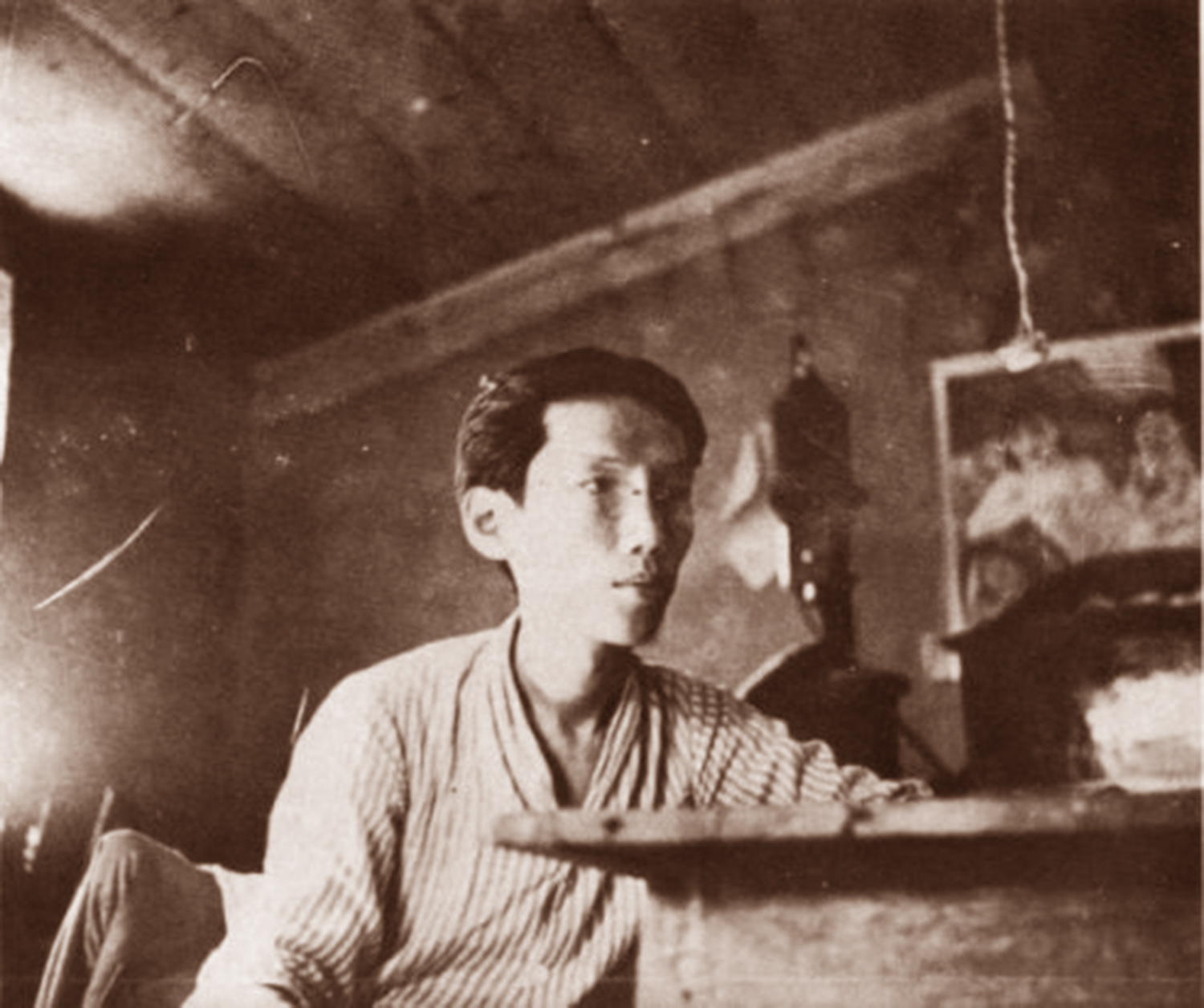
Prince Nguyễn Phúc Vĩnh San, the former Emperor Duy Tân, pictured at his house in St-Denis, La Réunion
The isle of La Réunion is accustomed to receiving “fallen” characters; thus did it once host Saïd-Ali, Sultan of Comoros, and Queen Ranavalo of Madagascar, both now deceased; and most recently the former emperors of Annam, Thanh-Thai and Duy-Tan, who at present still live in the capital, St-Denis.
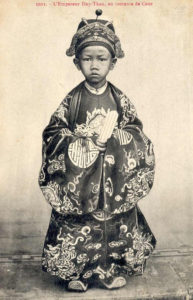
The eight-year-old Emperor Duy Tân after his coronation in 1907
One evening, as I returned very tired from a long trip to the mountains and walked slowly up the beautiful, wide rue de Paris, inhaling the deliciously fresh night air, I was suddenly brought to a halt outside the Hôtel de ville by the chords of a familiar symphony; the Philharmonic Society was rehearsing Peer Gynt. My old passion for music suddenly reawakened, I entered the large hall. There on the stage, a dozen instrumentalists applied themselves harmoniously, under the baton of a long-haired conductor, to the death of Ase. Two or three listeners listened religiously, hidden in the shadows.
After a few moments, I noticed that my neighbour, an elegant young man with Asian features, was following the score; during the intervals, he climbed onto the stage and conversed familiarly with the conductor and musicians.
Intrigued, I said to him:
“You like the music of Grieg, Monsieur?”
“Very much” came the reply. “I play the violin, and also, in the orchestra which you are listening to. I often play the oboe.”
“Really? Then you must know Peer Gynt very thoroughly, since you do not find it necessary to rehearse tonight.”
“Oh no, I usually attend rehearsals assiduously; but last Sunday I fell from my horse. I was taking part in the Grand Prix, riding Verdun, a beautiful but fiery beast, which, alas, sent me into the ditch before the start of the race. Look, my right hand is bandaged up.”
“Oh! Excuse me! So, therefore, you are an oboist and a jockey.”
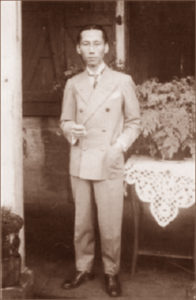
Prince Nguyễn Phúc Vĩnh San, the former Emperor Duy Tân, pictured at his house in St-Denis, La Réunion
Increasingly taken aback, I continued to converse with this singular young man, who seemed able to do everything, and whose curious accent, slightly creolised, left me feeling rather disconcerted.
I found the answer to the riddle when we exited the hall and exchanged cards; on his, I read:
Prince VINH SAN
Grand Croix du Dragon d’Annam
St-Denis, Réunion
“Grieg be praised!” I exclaimed. “I was only just wondering if I
might visit you, and now, by pure chance, I have been able to make your
amiable acquaintance!”Grand Croix du Dragon d’Annam
St-Denis, Réunion
And very kindly, the former Emperor Duy-Tan, known in La Réunion by the name of Prince Vinh-San, or “The Chinese Prince,” offered me an appointment at his home the very next morning.
At the house of Prince Vinh-San
Arriving in the low-rent district of St-Denis, on the rue du Conseil, I arrived at a single-storey wooden house, fronted by a tiny courtyard.
At the door to greet me was Prince Vinh-San, small and thin, with a tanned complexion, his raven hair combed back. Dressed in a stylish grey jacket, he greeted me courteously, with a friendly smile framed beneath large spectacles.
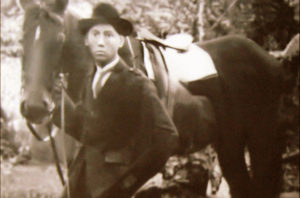
Prince Nguyễn Phúc Vĩnh San, the former Emperor Duy Tân, pictured with a race horse in La Réunion
While I set up my camera equipment, the Prince told me his story in the most correct French:
“After occupying the throne of Annam from 1907 to 1916, the best years of my life, I was one day misguided by some members of the “Young Annam” party, who wanted me to lead a revolutionary movement. I fled the palace of Hue on the night of 3 May 1916 to join the conspirators. My flight was quickly discovered. Four days later, remorseful, I went to see Messieurs Le Fol and Saunier, who led me to the Resident-Superior, Monsieur Charles.
Afterwards, I bitterly regretted that which I regarded as an act of madness. But you already know about this unfortunate affair, so I need not say more.
Travelling on the Guadiana, I arrived at the Pointe-des Galets on 20 November 1916, after a non-stop journey of 17 days.
At that time, I was just 19 years old. I was completely disoriented, and at first I found it very difficult to acclimatise to La Réunion; I was frequently gripped by fever and I suffered three bouts of Malarial Haematuria.
Admittedly, however, I have only praise for my relations with the inhabitants of La Réunion; they have always been very considerate towards me.
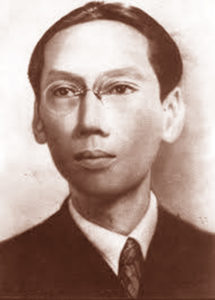
Prince Nguyễn Phúc Vĩnh San, the former Emperor Duy Tân
With the very small pension I receive from the Government General of Indochina, I live as you see, very simply, together with my brother, Prince Vinh-Chuong. For private reasons, I have no contact with my uncle [sic], the former Emperor Thanh-Thai.
I only agreed to take part in the horse races as a jockey because I wanted to augment my income; it has at least made possible the purchase of that small car which you will photograph.
My dearest wish, however, would be to live in France, in Paris, the only place where I could really indulge my passion for music, which I learned without a teacher – and for literature, because twice I have been a laureate of the Académie de la Réunion.”
As he said this, the prince presented me with a book which he had authored, entitled Trois nouvelles, published in St Denis in 1922 and dedicated to a “Mademoiselle F..”
More exactly, this book contained two short stories and one comedy in two acts. Do not be fooled by appearances, it was written in a French which lacked nothing in elegance; I noticed in it many Parisian as well as Creole expressions.
See also Wattebled’s second article At the House of the “Chinese King” which describes his interview with Prince Vĩnh San’s reclusive father, Prince Nguyễn Phúc Bửu Lân (the former Emperor Thành Thái).
Tim Doling is the author of the walking tour guidebook Exploring Hồ Chí Minh City (Nhà Xuất Bản Thế Giới, Hà Nội, 2014).
A full index of all Tim’s blog articles since November 2013 is now available here.
Join the Facebook group pages Saigon-Chợ Lớn Then & Now to see historic photographs juxtaposed with new ones taken in the same locations, and Đài Quan sát Di sản Sài Gòn – Saigon Heritage Observatory for up-to-date information on conservation issues in Saigon and Chợ Lớn.
Không có nhận xét nào:
Đăng nhận xét